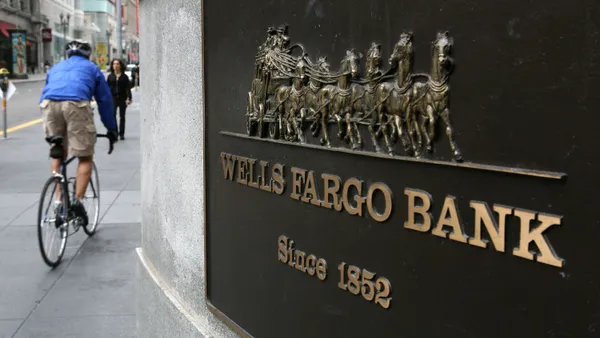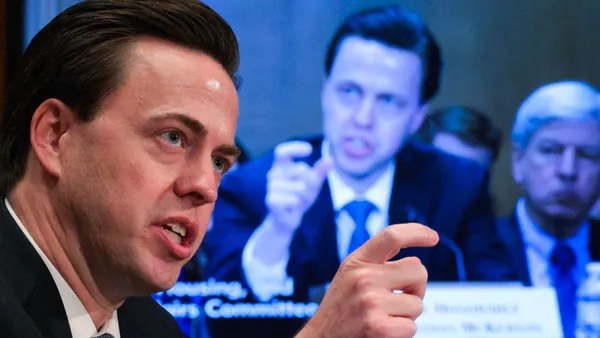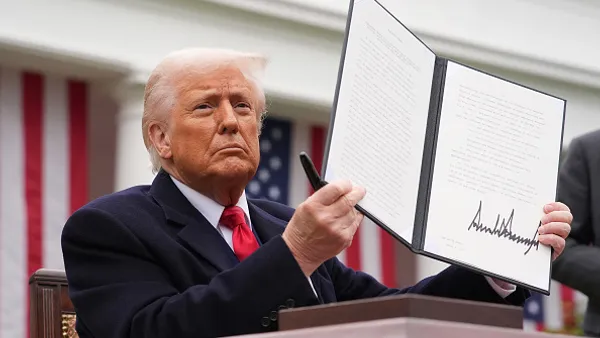Two banking regulators can expect changes at the top, according to reports that surfaced Friday.
Linda Lacewell, the superintendent of New York’s Department of Financial Services (NYDFS), is resigning from her position, effective Aug. 24, according to a letter emailed to colleagues.
“With a new governor about to take office, it is time for me to move on and make way for new leadership,” she wrote in the letter. “It has been a privilege to lead you over the past two and a half years.”
Lacewell’s last day at the helm of NYDFS is also the day Lt. Gov. Kathy Hochul is slated to take office as governor — a development cemented by Gov. Andrew Cuomo’s resignation last week in connection to a damning spate of sexual harassment allegations.
Although Lacewell, in her letter, cited the power shift in Albany as the reason for her departure, Lacewell was among the advisers who helped develop a public relations strategy for Cuomo as allegations of misconduct mounted, according to an investigation by New York's attorney general. Prior to her stint at NYDFS, Lacewell served as Cuomo's chief of staff.
Hochul said last week she would replace all Cuomo staffers implicated in the attorney general’s report of the outgoing governor’s conduct, according to Bloomberg.
Lacewell’s name is mentioned 35 times in the 168-page report, released this month. The investigation found that Cuomo sexually harassed 11 women, that he and his aides unlawfully retaliated against one of them, and that he fostered a toxic work environment.
In her letter, Lacewell listed several of NYDFS’s accomplishments during her tenure, including strides the department made on climate change. NYDFS last fall became the first state or federal regulator to ask financial institutions to integrate climate change-related financial risks into their business strategies, risk management processes and governance frameworks. It also began offering banks and credit unions credit under the state's Community Reinvestment Act (CRA) for financing activities that bolster climate resiliency in low- to moderate-income (LMI) communities.
Last month, the agency said it would ask financial institutions to share their diversity data as part of an initiative to promote diversity, equity and inclusion in the banking and financial services industry.
Lacewell, in her letter, also touted what she called the “modernization” of the agency’s approach toward virtual currency business licensing, the department’s pandemic-era waiving of ATM, overdraft and credit card fees, and its collection of more than $1 billion in enforcement penalties from banks throughout her time as superintendent.
A permanent leader for the CFTC?
In a separate development, President Joe Biden plans to name Rostin Behnam to lead the Commodity Futures Trading Commission (CFTC) on a permanent basis, Bloomberg reported Friday, citing anonymous sources.
Behnam, a Democrat, has served as the regulator’s acting chairman since January. His ascendancy to a permanent chief role, provided he garners enough congressional support, would let the Biden administration name a fifth commissioner to the CFTC. That would break a deadlock of two Republicans and two Democrats that has limited the regulator’s capacity to make policy strides in its oversight of a derivatives market that includes cryptocurrency trading.
Like Lacewell, Behnam’s best-known contribution is climate-related. He led a CFTC subcommittee that issued a report last year that suggested businesses be forced to pay for their greenhouse gas emissions to ensure reduced climate risk in financial markets. The report laid out 53 nonbinding resolutions that could serve as a policy blueprint for the Biden administration.
Although the CFTC’s then-chairman, Heath Tarbert, praised Behnam’s leadership in gathering “various private sector perspectives, the report likely would have been “functionally shelved” had Biden not been elected, a former CFTC aide told The Wall Street Journal at the time.
Tarbert targeted the subcommittee's acknowledgment that “'transition risks' of a green economy could be just as disruptive to our financial system as the possible physical manifestations of climate change, and that moving too fast too soon could be just as disorderly as doing too little too late.”
Behnam announced in March that the CFTC plans to set up a climate-change unit that would assess derivatives’ role in reducing carbon emissions.
An announcement regarding Behnam’s potential permanent role is still weeks away, Bloomberg reported, citing its sources. The White House declined to comment to Bloomberg. CFTC officials didn’t respond to requests for comment.













